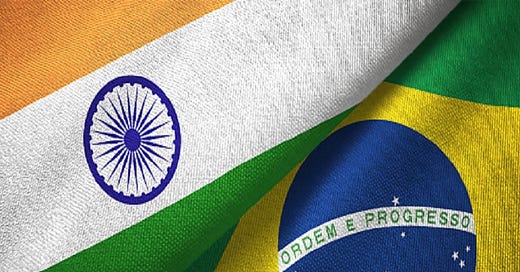Russia certainly seems to assess India’s related peacemaking intentions as much more sincere and serious than Brazil’s, but it also doesn’t appear to have a problem with the latter exploiting its newly re-elected leader’s proposal for promoting his political self-interests, at least at this point in time. As long as Brazil continues strengthening the tangible substance of its strategic relations with Russia, then the Kremlin is expected to ignore Lula’s latest publicity stunt, including his anti-Russian rhetoric while in DC.
Brazilian Ambassador to India Andre Aranha Correa do Lago told ANI on Monday that “Brazil and India have a very similar position regarding the war, which is that we want peace. And we believe that we have to find a way of bringing together on the table the two countries. And I believe that whatever we do towards peace will be valid.” This policy statement, for however well-intended it may be, downplays a key difference in their stances towards the Ukrainian Conflict.
Unlike India, Brazil previously voted against Russia at the UN General Assembly. Furthermore, in contrast to Indian Prime Minister Narendra Modi’s pragmatic refusal to publicly condemn either party in the New Cold War’s top proxy war, newly re-elected and now three-time Brazilian President Lula da Silva condemned Russia in a joint statement with US President Joe Biden during his recent trip to DC. It’s therefore a fact that these two BRICS countries actually have different stances towards the conflict.
To be sure, each of them publicly espouse a desire to promote peace talks, but they’re also going about it in different ways. India offered its diplomatic services to help mediate between Russia and Ukraine in the event that both parties request it to do so, while Brazil is actively trying to assemble a G20-like structure for bringing this about without either of them having asked for this. The contrast between their approaches deserves to be further elaborated upon.
India’s policy is one of principled neutrality, and it’s accordingly following diplomatic protocol to a tee by doing its utmost to not signal any partisan disposition in the conflict. Brazil, however, is bucking diplomatic protocol by unilaterally trying to advance its envisaged solution to the conflict without being requested by anyone to do this. Moreover, Lula’s joint condemnation of Russia with Biden confirms his partisan disposition, which is unambiguously opposed to Russia’s special operation in Ukraine.
With these observations in mind, their respective motives become more discernable. India truly doesn’t want to take any side in the New Cold War no matter what since its grand strategic interests are best served by remaining neutral in all such disputes. Brazil appears to believe that its grand strategic interests are best served by taking a “moderately pro-US” stance towards the Ukrainian Conflict, however, which aligns with the notion that Lula has recalibrated his multipolar vision since re-election.
It's therefore little wonder why a former Donbass diplomat told TASS that Lula’s G20-like peace proposal is likely just an insincere publicity stunt for generating clout abroad. Russia Foreign Minister Sergey Lavrov conspicuously avoided discussing it when talking to his Brazilian counterpart earlier this month, shortly after which Russia’s Ambassador to India confirmed that “not a single country has made a serious proposal or provided a tangible solution that meets Russian interests.”
This sequence of developments shouldn’t be misinterpreted as suggesting that there are problems in the Russian-Brazilian Strategic Partnership, but it also shouldn’t be spun by “5D chess master plan” conspiracy theorists as suggesting that they’re secretly coordinating future peace talks either. Rather, it’s simply the case that Lula is taking advantage of the Ukrainian Conflict to promote his return to the global stage, including to strengthen ties with the US that were damaged during his predecessor’s rule.
Russia certainly seems to assess India’s related peacemaking intentions as much more sincere and serious than Brazil’s, but it also doesn’t appear to have a problem with the latter exploiting its newly re-elected leader’s proposal for promoting his political self-interests, at least at this point in time. As long as Brazil continues strengthening the tangible substance of its strategic relations with Russia, then the Kremlin is expected to ignore Lula’s latest publicity stunt, including his anti-Russian rhetoric while in DC.
Brazil and India both have the sovereign right to formulate policy however their leaders believe is in their best interests so no value judgement is being made about either, but it’s nevertheless crucial to clarify the differences between their stances towards this proxy war after Brazil’s Ambassador to India downplayed them in his latest statement. They each support peace but are going about it in different ways, which also reveals a lot about their different grand strategic interests in the New Cold War.





Tough time for "non-aligned" countries... the big bully is out in full strength and arm-twisting everyone and everything in its aim to mantain hegemonic domination, by hook or by crook. Really a difficult threading for them as long as the bully stands up... when\if it goes down, then they will run over each other to show full independence, but until that time "sits as much on the fence as possible" will rule